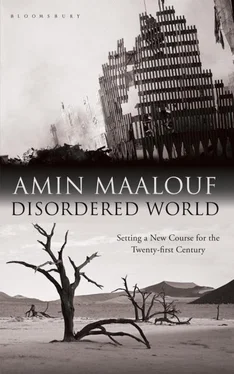I believe that the period of the French mandate in my own country, Lebanon, which lasted from 1918 to 1943, and also the final phase of the Ottoman presence (1864–1914), were much less harmful than the various regimes which have succeeded them since independence. It may be politically incorrect to set it down in black and white, but this is how I read the facts. (A similar pattern can be seen in several other countries, but out of tact I shall mention only my own.)
But if the excuse of colonialism is no longer acceptable to justify the failure of leadership in the Third World, the issue of the unhealthy relationship between the West and its former colonies remains crucial. It can’t be shrugged off with a quip or an irritated grumble.
For my part, I remain convinced that Western civilisation has contributed more than any other to the creation of universal values, but it has proved unequal to the task of transmitting them effectively. The whole of humanity is now paying the price for this failure.
The easy explanation is that other peoples are not ready for the transplant. This is a tenacious idea which gets passed on unquestioningly from generation to generation and century to century, so obvious does it seem. Its most recent outing came with the war in Iraq. ‘The Americans’ mistake’, so it is alleged, ‘was wanting to impose democracy on a people who didn’t want it.’ The statement is uttered like a judgement which admits of no appeal, and everyone gets something out of it, both Washington’s detractors and its supporters: the former mock the folly of such an undertaking and the latter praise its naive nobility. Such is the cunning of this received idea, which fits every shade of opinion and intellectual fashion. To those who are respectful of other peoples, it seems respectful; but those who are contemptuous or even racist also have their prejudices confirmed.
It is an assertion with the appearance of a realistic assessment; but from my point of view it is quite simply the opposite of the truth. What really happened in Iraq is that the US was unable to bring democracy to a people who longed for it.
Every time the Iraqis have had the chance to vote, they have flocked in their millions, even at the risk of their lives. Is there any other people on earth who would have queued outside polling stations in the certain knowledge that there would be suicide and car bombs? These are the people who we are told did not want democracy. This is repeated in the papers and in debates on the radio and on TV, and almost no one takes the time to examine it critically.
The other part of the assertion — that the US wanted to impose democracy — strikes me as equally dubious. It is possible to come up with more or less credible reasons that may have influenced the US decision to invade the country in 2003: the fight against terrorism and regimes suspected of aiding terrorists; the fear of a ‘rogue state’ developing weapons of mass destruction; the desire to get rid of a leader who threatened the monarchies of the Gulf and worried Israel; the wish to control the oil fields; and so on. Explanations with psychoanalytic overtones have even been put forward: for example, that President Bush wished to finish off the job that his father had left incomplete. But no serious observer, none of the witnesses or researchers who have combed through the accounts of meetings at which the decision to go to war was taken and who have produced a voluminous literature in recent years, has reported a shred of evidence to suggest that the real motive for the invasion was to install democracy in Iraq.
While it would be pointless to base a judgement on intent, it must be conceded that from the very first weeks of the occupation, the US authorities put in place a system of political representation based on religious or ethnic origin, which immediately triggered outbreaks of violence unprecedented in the country’s history. From my own firsthand experience in Lebanon and elsewhere, I can attest to the fact that communitarianism never causes democracy to flourish, to put it mildly. Communitarianism is a negation of the very idea of citizenship, and a civilised political system cannot be built on such a foundation. For all that it is crucial to take account of the different constituents that make up a nation (in a way that is subtle, flexible and implicit, so that every citizen feels he or she is represented), it is nonetheless pernicious and even destructive to set up a quota system which divides the nation permanently into rival tribes.
That the great American democracy brought the Iraqi people this poisoned gift of sacrosanct communitarianism is a shame and an indignity. If it was done out of ignorance, it is distressing; if it was a cynical calculation, it is criminal.
It is true that before the invasion and throughout the conflict there was much talk of freedom and democracy. Such utterances have been a matter of course everywhere and always. Whatever the objectives of a military operation, it is preferable to say that it was undertaken for justice, progress or civilisation; for God and his prophets; for widows and orphans; and also, of course, for legitimate self-defence and out of a love of peace. No leader wants people to say that his real motives were vengeance, greed, fanaticism, intolerance, the will to dominate or the desire to silence his opponents. The role of propagandists is to conceal the real aims behind noble disguises, and the role of free citizens is to scrutinise their actions to strip away the lies that cloak them.
That said, in the wake of the attacks of 11 September 2001 there was undoubtedly in the United States a brief infatuation with spreading democracy. When the nationalities of the members of the suicide squad became known, some officials expressed the opinion that America would be safer if the Arab world were governed by democratic, modernising regimes, and that the country had been wrong until then to support obscurantists and autocrats whose only virtue had been their willingness to be aligned with Washington. Shouldn’t these ‘clients’ have been required to share some of the values revered by their protector?
This infatuation — translated into high-flown slogans such as ‘the Greater Middle East’ or ‘the New Middle East’ — misfired. I shall not dwell therefore on this episode, but perhaps I may express en passant my astonishment at this spectacle: the leader of the Western democracies wondering at the dawn of the twenty-first century if it might not be a good idea after all to support the emergence of democratic regimes in Egypt, Arabia, Pakistan and the rest of the Muslim world. Having encouraged almost everywhere powers whose first virtue was ‘stability’ without looking too closely at how they maintained it; having supported ultra-conservative leaders without worrying about the ideology upon which their conservatism was based; having trained highly repressive security and police forces, especially in Asia and Latin America, now the great American democracy wondered if it wouldn’t be a good idea after all to play the democracy card.
But this fine idea was soon forgotten: after three laps of the track, the land of Abraham Lincoln reached the conclusion that all this was much too risky; that feelings were running so high that free elections would bring the most radical elements to power almost everywhere; and that it was better therefore to stick to tried and tested solutions. Democracy would have to wait.
In the months that led up to the invasion of Iraq, Secretary of State Colin Powell often found himself in the most awkward situation imaginable: having to convince the whole world that the war absolutely had to go ahead, while in private making great efforts to persuade his president not to proceed.
Читать дальше












